Spring just has to be the most exciting time of year for us gardeners.
The equinox has passed and the sun is climbing in the sky offering us longer days, more sun to help our plants grow and milder days to work in the garden.
Oh, I know many of you are still in the grip of Old Man Winter, but, Spring will come soon enough. Have you started your seeds yet? Planned this year’s garden? Started cleaning out the beds?
Here in the South, our gardens are transforming, with the end of our winter crops of leafy greens, root vegetables and green peas clearing space for warm weather crops such as beans, cucumbers, squash, melons, tomatoes, peppers, eggplant and the like.
I’ve been harvesting Snap Peas for weeks.
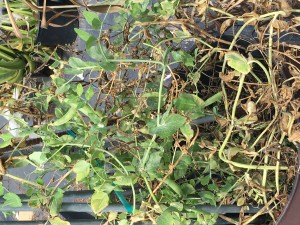
Tired Pea Vines!
The vines are looking a little peaked now and I think it’s time to cut the pea vines and plant something else in that tub. Since I grew peas, which added lots of nitrogen to the soil, I’ll grow a heavy feeder such as a Tomato, Pepper or Eggplant in that tub.

New Lavender, Thyme and Rue!
New herbs are being stocked here at The Herb Cottage just in time for Spring shows and markets.
People are making their way out to the farm to get the best selection of herbs and vegetables, too.
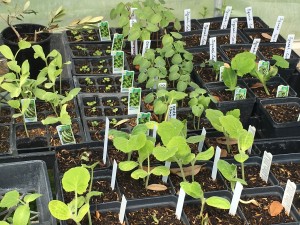
Cucumber, Melons, Okra
In the herb beds, new growth is everywhere!
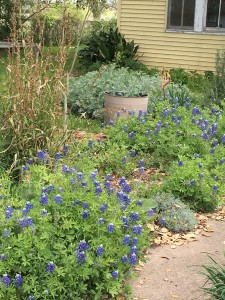
Texas Bluebonnets love The Herb Cottage!
Of course, since I let our State Flower, the Texas Bluebonnet, grow wherever it pleases, the beds are full of them now. I’ll have to wait another few weeks until they fade and throw their seed out before I can replant my favorite warm weather annual, basil.
In the greenhouse, I have seeded traditional Genovese Basil, but also lemon, lime, Holy and Thai varieties.
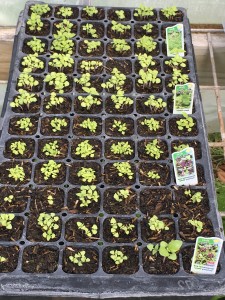
Los of little basil! 4 varieties!
Each type has a different aroma and flavor. Watch for it at my markets starting in mid to late April.
This year I also have African Blue Basil, which I ordered in for a local bee keeper. He said his bees love it the best. So… if you want to attract bees to your gardens and yard, plant some African Blue Basil for them. Most people find the flavor of the African Blue variety too strong for cooking, but it makes a fabulous landscape plant for the bees and for cut flowers. It’ll bloom until frost! If you live in a frost free area, African Blue Basil is perennial! Start more plants from cuttings, as the seed is sterile.
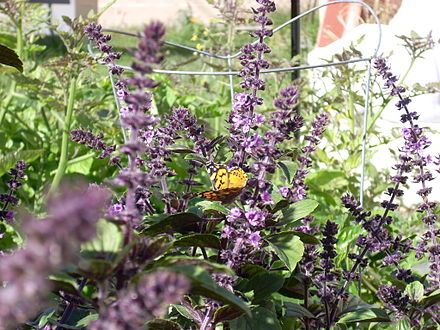
African Blue Basil- Photo Courtesy of Wikipedia
African Blue Basil isn’t just for bees. It’s a great butterfly plant as well.
In fact, most plants that bees like are also favored by butterflies.
We are learning more and more how important pollinators are, not just for our own gardens, but for commercial growing as well. The loss of habitat, pesticide impact and other stressors, including disease, has taken its toll on our bee population. Butterflies do not seem to be in decline in my area, but Monarch habitat is shrinking in areas where they over-winter and the decrease in milkweed, due to herbicides in farm fields, leaves the Monarchs with fewer and fewer places to lay their eggs.
If you value the diverse world of insects, the beauty of our butterflies and the great variety of food offered in our grocery stores, it’s easy to make your garden attractive to pollinators and make it beautiful, too.
Herbs are fantastic attractors for many pollinators. All basils, if left to bloom, attract bees. Plants in the Umbelliferae family such as parsley, dill, chervil, carrots, Queen Anne’s Lace, cumin, celery and fennel will bring lots of butterflies to your gardens.
These herbs and others, planted near your vegetables and allowed to flower, will help bring pollinators so you have good yields of squash, cucumbers and melons, which all need the help of pollinators to bring the pollen from the male flower to the female flower. If you’ve ever tried to grow squash or cucumbers and have seen the tiny fruit behind the female flower wither and fall off, the problem may be lack of pollination. These flowers are only pollinated by insects, not wind. So bringing pollinators to your vegetables will assure you a good crop.
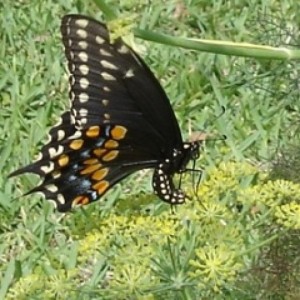
Swallowtail Butterfly on Dill
If you’re looking for seeds, please consider the selection at The Herb Cottage Website. I carry high quality seeds, many organic varieties, all open pollinated so you can save your own seeds if you like.
Check the calendar on the Website to find me at markets, garden shows and the like. Or give me a call, 361-258-1192, and arrange a time to come out to the farm and shop here! You’ll get the best selection and a visit to the country, too.
I wish you the best gardening season ever– the perfect balance of rain and sun to make all your plants grow!
QUOTE FOR THE MONTH
No amount of belief makes something a fact.
-James Randi, magician and skeptic (b. 1928)
